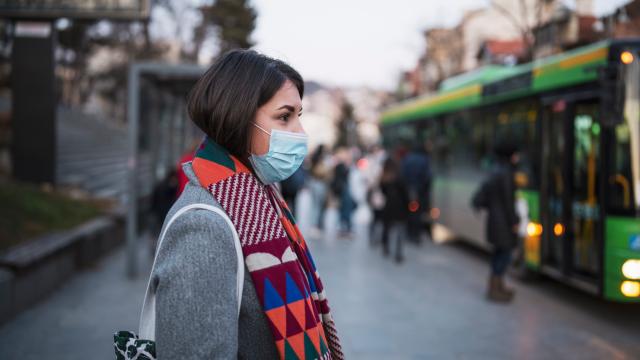When I first came across this post from the Cleveland Clinic about mask anxiety, I thought it had something to do with anxiety caused by other people refusing to wear masks. And while that is certainly something many of us have been struggling with over the past several months, the article is referring to another type of mask-related anxiety — anxiety over wearing masks. Here’s what you need to know, along with some tips to help you get a handle on this specific stressor.
[referenced id=”930349″ url=”https://www.lifehacker.com.au/2020/06/put-your-mask-over-your-damn-nose/” thumb=”https://www.gizmodo.com.au/wp-content/uploads/sites/4/2020/05/coronarestrictions-300×169.jpg” title=”Put Your Mask Over Your Damn Nose” excerpt=”We know that you should be wearing some form of face covering to prevent the spread of the coronavirus. You just should. Don’t argue with me on this.”]
What is mask anxiety?
Face masks have been one of the most visible and polarising aspects of the pandemic. It wasn’t long ago when it would have been hard to believe that something designed to keep other people (and yourself) safe would become such a political hot button, but here we are.
Except not all people who have trouble with face masks are motivated by political reasons. In fact, some people may truly want* to wear a mask (for public health and self-protective purposes), but aren’t able to bring themselves to do so, because even the thought of it can cause stress or panic. This is especially an issue for people with existing anxiety disorders and/or claustrophobia, according to Dr. Brian Barnett, a psychiatrist at the Cleveland Clinic.
“While some people with mask anxiety may experience only psychological manifestations, others may have symptoms such as rapid heart rate, shortness of breath, chest tightness, sweats and dizziness,” Barnett explains in the post. But if you’ve never felt these sensations before, you might not realise that you’re experiencing symptoms related to anxiety. If you fall into this category, he has some tips for helping you manage.
(*Yes, we know masks are hot and uncomfortable and, under different circumstances, most people — with maybe the exception of bank robbers — would choose not to wear one. But in this example, it’s someone who understands the benefits of a face mask and wants to do their part.)
[referenced id=”931466″ url=”https://www.lifehacker.com.au/2020/07/how-masks-protect-us-from-the-coronavirus/” thumb=”https://www.gizmodo.com.au/wp-content/uploads/sites/4/2020/07/01/fmsifdkbrbjvck9tsfgr-300×169.jpg” title=”How Masks Protect Us From the Coronavirus” excerpt=”Masks protect us. That shouldn’t be a surprise at this point, but since there’s been so much confusion about what masks do, and there are a lot of myths floating around about them, it’s time for a little refresher.”]
Tips for dealing with mask anxiety
While Barnett points out that people with more severe cases of mask anxiety may want to seek professional mental health treatment, there are a few things anyone can try on their own.
Find a mask that works for you
At this point, there is no “standard” version of a reusable face mask — we have options. Barnett says that shopping for a face mask that works for you can be “empowering.” This makes sense: finally finding a mask that fits and is relatively comfortable can make a big difference.
So if you first tried to wear a cloth face mask a few months ago (before they started becoming more widely available on Etsy, and later, mass-produced), you should know that there are so many more options out there now. There are breathable fabric masks that might be more comfortable than others, not to mention an array of colours and designs.
For example, I had a decent amount of face-mask-wearing experience pre-COVID, and owned several that were relatively comfortable. Then I ordered a few from a small shop in LA, and they fit so well that it significantly improved my mask-wearing experience — to the point where sometimes I forget I have one on. The takeaway here is that you may have to virtually shop around and try out a few mask fabrics, shapes and designs before finding one that makes you feel less anxious than others.
Test drive masks at home
If you’re uncomfortable with the sensation of wearing a face mask, Barnett suggests trying to wear one at home, so at least you’ll be in a safe, comfortable and familiar place as you get used to having it on your face. You don’t have to start out wearing it for hours, either. He suggests beginning with small stretches of time and working your way up from there.
Challenge your anxious thoughts
If you’ve tried cognitive behavioural therapy (CBT) before, then you’re probably at least somewhat familiar with the concept of challenging your negative thoughts. Barnett says that strategy could work with mask anxiety, too. For instance, if you’re anxious about whether the flow of oxygen to your lungs is being reduced because of the mask, he recommends reminding yourself that medical professionals have been wearing masks regularly for more than 100 years without dealing with that side effect.
Barnett’s next thought-challenging tip is to remind yourself “that contracting COVID-19 while not wearing a mask is far more dangerous to your health than feeling uncomfortable while wearing one is.” As a person with anxiety, I’m not sure how I feel about replacing one stressor with another (you can be anxious about wearing a mask and contracting COVID at the same time), but that’s not to say that this won’t work for some people.
I can, however, relate to Barnett’s final suggestion: Think about wearing a face mask as one of the few things you can do to feel in control during a time when everything is uncertain. It may not make your mask anxiety disappear, but if you’re someone who doesn’t handle the feeling of everything being beyond your control very well, this framing may help.

Leave a Reply
You must be logged in to post a comment.